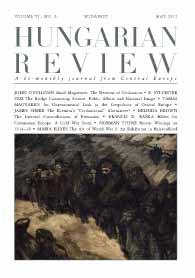World War I: Controversies, Paradoxes, Revisions – On the Book of Lucian Boia
World War I: Controversies, Paradoxes, Revisions – On the Book of Lucian Boia
Author(s): Ambrus MiskolczySubject(s): History
Published by: BL Nonprofit Kft
Summary/Abstract: World War I is a topic of currency these days, owing to its one hundredth anniversary and also prevailing global current affairs. The two go a long way to explaining the less than enthusiastic reception in Germany given to Niall Ferguson’s book, in which the author suggests that Britain made a mistake by entering the war, and that all sides stood to gain from a quick German victory. By contrast, Christopher Clark, in his best-selling monograph Sleepwalkers, argues that leading European politicians were dragged into the war against their will and despite their sense of foreboding, and that they deceived themselves by predicting that the war would be a short one. The fingerpointing at who was to blame began immediately after the cataclysm. Although as early as the 1920s the Soviet historian Yevgeny Tarle maintained that the concept of “moral sin” was unscientific and regarded both sides at war as equally liable, Fritz Fischer’s thesis about Germany’s exclusive culpability, advanced in the 1970s and 1980s, became almost as popular as Clark’s recent analysis, foreshadowing the eventual demise of the blame-game in historiography. Yet in our corner of the world – that is to say, on the fringes – the debate continues to unfold today in terms of national gains and advantages.
Journal: Hungarian Review
- Issue Year: VI/2015
- Issue No: 03
- Page Range: 82-94
- Page Count: 13
- Language: English

